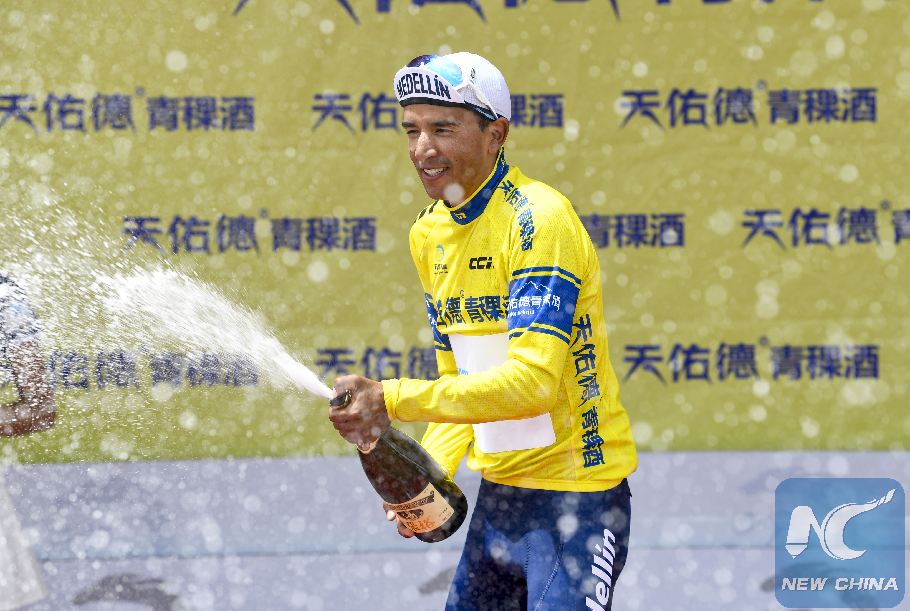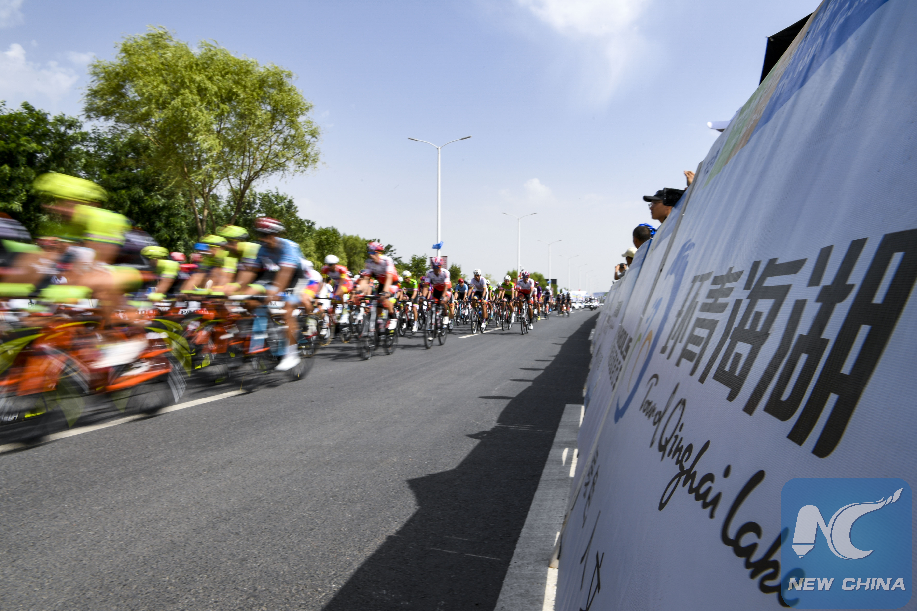
The Tour of Qinghai Lake attracted more cycling enthusiasts from around the world, both because of the beautiful scenery on the route and the challenges brought by the tough climate and elevation.
by Vivian Ji
YINCHUAN, July 28 (Xinhua) --The 18th Tour of Qinghai Lake wrapped up on Sunday in the city of Yinchuan, northwest China's Ningxia Hui Autonomous Region, with Robinson Chalapud Gomez of Colombian team Medellin coming out on top of this year's challenge.
The tour took place over 14 days and covered 13 stages in total. Riders started their long journey in Qinghai Province on July 13, and came to the end of the tour after trekking across three provinces, covering a total distance of 1,841 km.

Robinson Chalapud Gomez of Colombian team Medellin won the Tour of Qinghai Lake. (Xinhua/Feng Kaihua)
Twenty-two competing teams of some 1,500 riders from all around the world came to this year's event.
This year is the 18th birthday of the Tour of Qinghai Lake, which has turned into a cycling event of international stature during its lifetime. As the Tour grew, it attracted more cycling enthusiasts from around the world, both because of the beautiful scenery on the route and the challenges brought by the tough climate and elevation.
The environmental issues were a major issue from the outset, but the event has gradually overcome them as more and more cyclists are drawn to compete here.

Cyclists competed in the last stage of the Tour of Qinghai Lake. (Xinhua/Feng Kaihua)
The government of Qinghai worked to establish the event in 2002 with the hopes of publicizing their province's natural beauty.
The Tour got off to a rocky start in its initial years. In 2002, the necessary equipment was not prepared and referees could only use traditional tools to measure racers' times rather than a watch. In 2003, many of the invited teams refused to compete because of SARS.
The Tour managed to get through these tough times and made it to a brighter future. In 2004, the Tour elevated its level to 2.3, emerging as the top cycling race in Asia.
In 2007, the enrollment system changed from invitation-based to an open application with the prize set at 300,000 US dollars. In 2013, the route expanded outside of Qinghai Province, and for the first time the tour crossed three provinces and regions including Qinghai, Gansu and Ningxia.
Now, the Tour of Qinghai Lake is one of the top races on earth. It is the world's fourth biggest cycling event, after the Tour de France, Tour of Italy and Tour of Spain.
This annual event draws cycling enthusiasts and professionals from all around the globe to Qinghai.
"Tours in Europe usually take 8 days, but Tour of Qinghai Lake takes 14 days. It makes the tour an extra challenging one, but this is also exactly why riders want to finish the tour to prove themselves," said Tom Van Damme, President of the Road Commission and of the Professional Cycling Council of UCI.
"The Tour of Qinghai Lake definitely plays an important role in Asian UCI Tours. In the past years, we had winners from many different countries, showing that Tour of Qinghai Lake is truly an international event," Van Damme said.
The success of the Tour of Qinghai Lake has also promoted local tourism. The route centers around Qinghai Lake, and extends to many regions including agricultural regions in Eastern Qinghai, pastoral regions and desert areas in Western Qinghai, grasslands in the Southern Qinghai Plateau, Hexi Corridor in Gansu Province and the Gold River Bank in China's Ningxia Hui Autonomous Region.
By following the riders on the Tour of Qinghai Lake, tourists get the opportunity to enjoy incredible scenery, immerse themselves into the rich local culture, and learn about how the ethnic diversity of the three provinces/regions. The Tour of Qinghai Lake is set to continue opening up cycling culture here in China and showing the country's incredible natural beauty to cyclists and fans from all over the world.

